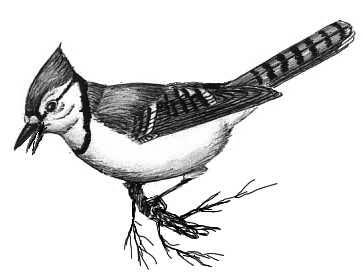
Dear Bird Folks,
Last fall I heard a Blue Jay giving some unusually quiet, soft, baby-like calls. I figured that it was a young bird that hadn’t learned its signature “jay” call yet. This past April I heard the same bird again, giving the same soft calls. Now I’m wondering if this bird hadn’t been taught to sing properly. Could this jay have lost its parents early on, before it was taught to sing? Will it ever learn its famous jay call?
-Donna, South Orleans, MA.
You’re the first Donna,
In the ninety-six years that I have been answering bird questions, you are the first person to complain that one of your Blue Jays isn’t loud enough. Usually when I hear the name, Blue Jay, it’s preceded by the phrase, “Those *^&%$#@!*^@* jays are so *^&%$#@!*^@* loud. They wake me up every morning.” (I hope I spelled that right. I’m never sure if *^&%$#@!*^@* has one @ or two.) The mysteries of bird behavior have intrigued researchers since before lab coats were invented. The unanswered questions are endless. How do migrating birds find their way back to the same place each year? How are birds able to weave an intricate nest without having hands? How are robins able to swallow an entire worm without making a disgusted face? Next to the question about the worm, one of the most studied questions is how do birds learn their calls.
The ability to vocalize is important to most birds. Without using words, as we know them, they are able to stake out a territory, keep a flock together, alert others to danger, attract a mate and guide their offspring. Yet not all birds have evolved with the same vocal skills. Some birds, such as Brown Thrashers, have hundreds of different songs, while a Turkey Vulture never says a word. They don’t even have a syrinx (the bird equivalent to our larynx) with which to produce sounds. Hissing is the best they can do. I know it sounds a bit sad to think that Turkey Vultures can’t speak, but it’s just as well they can’t. Vultures have serious breath issues.
Your suggestion is correct that many young birds, especially songbirds, need to learn their songs and calls from the adults. Tests have shown that when some baby birds are raised in soundproof chambers, they aren’t able to sing as well as birds that are exposed to the proper calls. They can still sing, but not well enough to be recognized by the other birds. They become bird scat singers and nobody knows what the point of their song is. Yet other birds don’t have this problem. Most waterfowl and shorebirds don’t learn their calls, but are born with the vocalization skills built in. Ducks, for example, will still quack perfectly even if the only sounds they are exposed to are parrots, or frogs, or Donny Osmond.
The interesting thing about their vocal learning is that baby birds are somehow able to filter out all the other sounds around them, including the calls of other bird species. With a few exceptions, mockingbirds, for example, most songbirds learn the calls of only their own species. Somewhere in their tiny bird brains, songbirds have a template that guides them as to which songs to learn and which to ignore. If baby birds didn’t have this template, they might grow up sounding like whichever birds in the neighborhood sang the loudest. We could end up with chickadees that sounded like cardinals, or crows, or Donny Osmond.
You might think this would suggest, Donna, that your theory was correct, and your odd sounding jay may not have learned to sing at a young age. But it’s not that simple. Jays have a huge variety of vocalizations. Their calls range from their raucous “jay” call, to screams that sound like hawks, to nearly silent, whiny, whimpering sounds. When alone, jays sometimes softly mumble to themselves like a person who is fumbling through their sock drawer, trying to match the colors. (I’ll bet you didn’t see that analogy coming.)
The other factor to consider is that jays all look alike to us. The bird that you heard this year, may be a totally different bird than the one you heard last year. What seems like odd sounds coming from one specific jay may be normal sounds coming from several different jays. My guess is that your jay could speak just fine if it needed to. Hey, I’ve got an idea. The next time you hear a wimpy jay, blow up your inflatable cat and set it out in the yard. If my theory is right, the bird will start screaming “JAY!” loud enough to alert every bird in town. If it doesn’t do that, then your theory will be correct. Then all you’d have to do is explain why you own an inflatable cat.